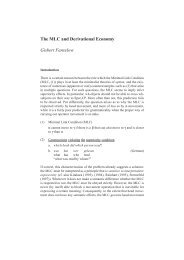Connectionist Modeling of Experience-based Effects in Sentence ...
Connectionist Modeling of Experience-based Effects in Sentence ...
Connectionist Modeling of Experience-based Effects in Sentence ...
You also want an ePaper? Increase the reach of your titles
YUMPU automatically turns print PDFs into web optimized ePapers that Google loves.
Chapter 3 <strong>Connectionist</strong> Modell<strong>in</strong>g <strong>of</strong> Language Comprehension<br />
<strong>Experience</strong> Account (p. 44) that attacks the modular picture <strong>of</strong> knowledge and<br />
memory. The crucial claim <strong>of</strong> MC02 is that differences <strong>in</strong> performance result from process<strong>in</strong>g<br />
skill as a function <strong>of</strong> experience and not a separable WM capacity.<br />
“In our view, neither knowledge nor capacity are primitives that can vary<br />
<strong>in</strong>dependently <strong>in</strong> theory or computational models; rather they emerge from<br />
the <strong>in</strong>teraction <strong>of</strong> network architecture and experience.” (p. 37)<br />
The subsymbolic (and behavioristic) nature <strong>of</strong> connectionist networks make grammatical<br />
knowledge and process<strong>in</strong>g <strong>in</strong>dist<strong>in</strong>guishable. A change <strong>in</strong> parameters like weight<br />
vectors or hidden layer size is not attributable to one <strong>of</strong> the two components. Rather<br />
either affects the behavior <strong>of</strong> the whole network.<br />
3.3.2 Critique and Relation to other Approaches<br />
MC02 see their model as an opposition ma<strong>in</strong>ly to models like Just and Carpenter (1992)<br />
and Waters and Caplan (1996), which explicitly account for memory capacity limitations.<br />
MC02’s SRN simulations have important implications with respect to biological plausibility<br />
<strong>of</strong> process<strong>in</strong>g models. they demonstrated that there is no need to assume separable<br />
work<strong>in</strong>g memory and knowledge modules <strong>in</strong> order to account for effects attributed to<br />
these. Rather experience shapes the whole system and capacity is a property emergent<br />
from the systems architecture. That emphasizes the role <strong>of</strong> symbolic models like Just<br />
and Carpenter (1992) as merely higher-level descriptions <strong>of</strong> underly<strong>in</strong>g processes. There<br />
is, <strong>of</strong> course, noth<strong>in</strong>g wrong with symbolic descriptions. What is <strong>in</strong> question, however,<br />
is the justification <strong>of</strong> explicit numerical limits on capacity. In Just and Carpenters account<br />
the capacity limit is def<strong>in</strong>ed as the maximal amount <strong>of</strong> activation attributed to<br />
productions (process<strong>in</strong>g rules). The latter can be varied without touch<strong>in</strong>g the rest <strong>of</strong> the<br />
system. Argu<strong>in</strong>g with MC02, however, this value is <strong>in</strong>deed emergent and <strong>in</strong>separable<br />
from the entire system. As a consequence sentence comprehension and read<strong>in</strong>g span<br />
measure the same th<strong>in</strong>g, namely read<strong>in</strong>g skill, which is the experience-shaped efficiency<br />
<strong>of</strong> l<strong>in</strong>guistic processes.<br />
Non-L<strong>in</strong>guistic Work<strong>in</strong>g Memory<br />
Not conv<strong>in</strong>ced by this view Roberts and Gibson (2002) note that a pure skill-viaexperience<br />
account would not be able to expla<strong>in</strong> these correlations <strong>of</strong> comprehension skill<br />
with non-l<strong>in</strong>guistic work<strong>in</strong>g memory tasks that do not <strong>in</strong>volve sentence read<strong>in</strong>g. Roberts<br />
and Gibson provide respective empirical evidence for correlations <strong>of</strong> sentence memory<br />
with several memory load tasks that do not <strong>in</strong>volve read<strong>in</strong>g sentences. Address<strong>in</strong>g these<br />
correlations MC02 propose that read<strong>in</strong>g skill is tied to phonological representations.<br />
These representations play the crucial role <strong>in</strong> all sorts <strong>of</strong> memory load tasks and account<br />
for <strong>in</strong>dividual differences. Regard<strong>in</strong>g phonological representations MC02 formulate four<br />
important claims (p.45):<br />
54
















